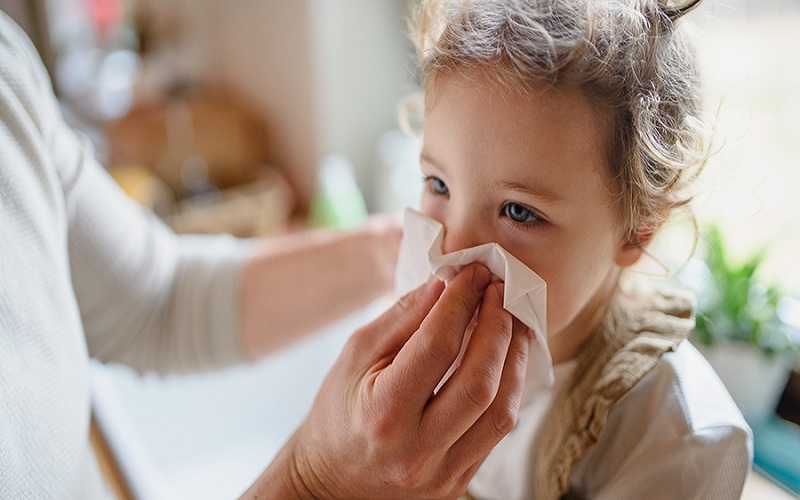As a parent, it can be distressing to see your child suffering from a common cold. Caring for a child with a cold requires patience, understanding, and the right guidance. Pediatricians play a crucial role in providing advice and support to parents during these times. In this article, we will discuss pediatric recommendations for treating a child with a common cold,
Understanding the Common Cold in Children
The common cold is a viral infection of the upper respiratory tract that primarily affects the nose and throat. It is one of the most frequent illnesses in children, especially those attending daycare or school. Rhinoviruses are the most common culprits, though other viruses such as adenovirus, coronavirus, and respiratory syncytial virus (RSV) can also cause cold symptoms.
Pediatrician Advice for a Child with a Cold
Pediatricians offer valuable guidance on managing a child’s cold symptoms effectively. Here are some key recommendations:
Encourage Rest: Rest is essential for helping the body fight off the virus and recover more quickly. Pediatricians advise parents to encourage their child to rest as much as possible, including taking naps during the day.
Maintain Hydration: Adequate hydration is crucial to prevent dehydration and help loosen mucus. Pediatricians recommend offering plenty of fluids such as water, diluted fruit juice, clear broth, or electrolyte solutions. Avoid giving sugary drinks or caffeinated beverages.
Use Saline Nasal Drops: Saline nasal drops can help alleviate nasal congestion and make it easier for the child to breathe. Pediatricians often recommend using saline drops followed by gentle suction with a bulb syringe for infants and young children who are unable to blow their noses.
Humidify the Air: Dry air can exacerbate nasal congestion and throat irritation. Using a cool-mist humidifier in the child’s room can help keep the air moist and ease symptoms.
Provide Comfort Measures: Comfort measures such as warm baths, gentle massages, and cuddling can provide relief from discomfort and help the child feel more comfortable.
Administer Fever Reducers: If the child has a fever and is uncomfortable, pediatricians may recommend giving acetaminophen or ibuprofen according to the appropriate dosage based on the child’s age and weight. However, it’s essential to follow the pediatrician’s advice and avoid overdosing.
Avoid Over-the-Counter Cough and Cold Medications: Pediatricians generally advise against using over-the-counter cough and cold medications in young children due to the risk of side effects and lack of proven effectiveness. These medications can sometimes cause serious adverse reactions in young children and should only be used under the guidance of a pediatrician.
Encourage Good Hygiene Practices: Teach your child the importance of handwashing to prevent the spread of germs. Encourage them to wash their hands frequently, especially before eating, after using the bathroom, and after coughing or sneezing. Additionally, teach them to cover their mouth and nose with a tissue or their elbow when coughing or sneezing.
Frequently Ask Question
Can my child go to school or daycare with a cold?
It’s generally advisable to keep your child home from school or daycare while they are experiencing cold symptoms. Not only does this help prevent the spread of the virus to other children, but it also allows your child to rest and recover more quickly.
When should I seek medical attention for my child’s cold?
You should seek medical attention if your child’s symptoms worsen or if they experience any of the following:
- Difficulty breathing
- High fever
- Ear pain
- Persistent cough
- Signs of dehydration (e.g., decreased urination, dry mouth)
- Unusual lethargy or irritability
Are antibiotics effective for treating a cold?
No, antibiotics are not effective against viral infections such as the common cold. They should only be used if your child develops a bacterial infection secondary to the cold, such as an ear infection or sinusitis, and under the guidance of a healthcare professional.
How can I prevent my child from catching a cold?
While it’s not always possible to prevent colds entirely, you can reduce your child’s risk by:
- Encouraging regular handwashing
- Teaching them to cover their mouth and nose when coughing or sneezing
- Avoiding close contact with individuals who are sick
- Ensuring they get plenty of sleep and eat a healthy diet to support their immune system
- Conclusion
Pediatricians play a vital role in advising parents on how to manage a child’s common cold effectively. By following their recommendations, parents can help alleviate their child’s symptoms and support their recovery.



